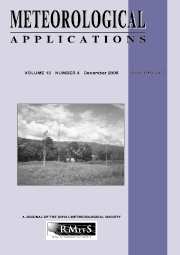Article contents
Moist convective instability over the Arabian Sea during the Asian summer monsoon, 2002
Published online by Cambridge University Press: 22 February 2006
Abstract
The moist convective instability over the Arabian Sea during the Arabian Sea Monsoon Experiment 2002 is studied using high resolution radiosonde data over the Arabian Sea off the west coast of India and inland at Goa (15°21′N, 73°51′E). The vertical structure of the lower troposphere is discussed in terms of the profiles of conserved variables and the time series of convective available potential energy (CAPE), mixed-layer depth, lifting condensation level and level of free convection. Analysis shows that the Arabian Sea within 200 km of the west coast of India is characteristically a low-CAPE region irrespective of whether it is a good or bad monsoon season. Little or no variability in the mean (0–500 hPa) lapse rate during July and August indicates the quasi-equilibrium state of the tropical atmosphere during the summer monsoon with an approximate balance between the convective and large-scale forces. Large-scale forcing for the ascent of surface air seems to be of prime importance for triggering deep convection and rainfall over the East Arabian Sea. Case studies of precipitating convection over inland at Goa during the monsoon indicate a moistening and warming of the lower troposphere following the convection.
Information
- Type
- Research Article
- Information
- Copyright
- 2006 Royal Meteorological Society
- 9
- Cited by

